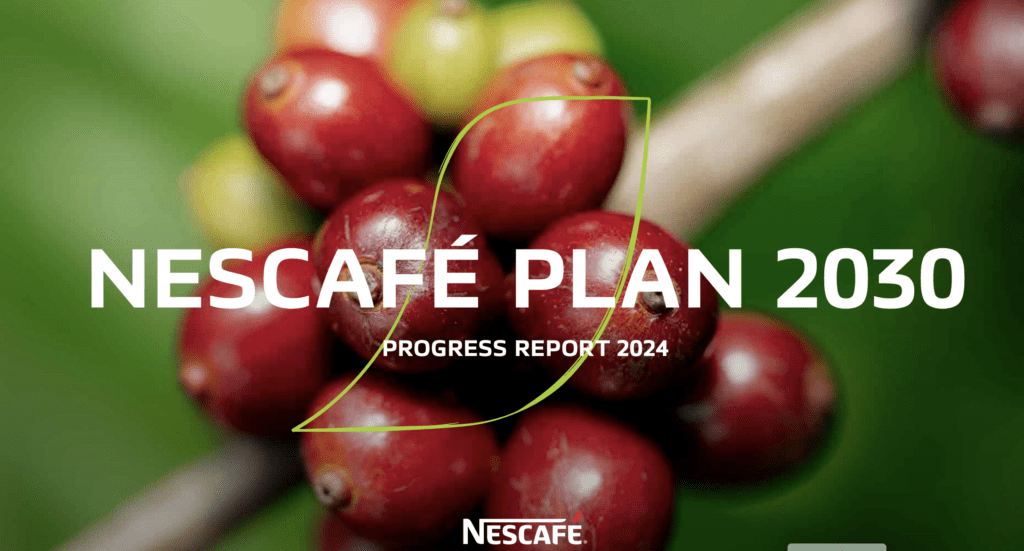Nescafé already achieved its 2025 regenerative agriculture goals in 2024
Nescafé, Nestlé’s largest coffee brand, will source 32 percent of its coffee from farmers using regenerative farming practices in 2024. According to the 2024 global report on the results of the Nescafé Plan 2030 program, this proportion has already exceeded the 20 percent target set for 2025, demonstrating farmers’ commitment to regenerative agriculture.
 Nescafé supports coffee farmers in implementing practices such as optimized fertilization, mulching, soil cover and composting to promote sustainable coffee production, increase productivity and reduce costs. These measures not only improve farming efficiency and resilience, but also contribute to reducing greenhouse gas (GHG) emissions associated with coffee production. In 2024, Nescafé Plan participants achieved a GHG reduction of between 20 and 40 percent per kilogram of green coffee – taking into account most origins where direct data on greenhouse gas emissions associated with production is available. This covers 30 percent of Nescafé’s green coffee supply.
Nescafé supports coffee farmers in implementing practices such as optimized fertilization, mulching, soil cover and composting to promote sustainable coffee production, increase productivity and reduce costs. These measures not only improve farming efficiency and resilience, but also contribute to reducing greenhouse gas (GHG) emissions associated with coffee production. In 2024, Nescafé Plan participants achieved a GHG reduction of between 20 and 40 percent per kilogram of green coffee – taking into account most origins where direct data on greenhouse gas emissions associated with production is available. This covers 30 percent of Nescafé’s green coffee supply.
The coffee sector has been particularly exposed to the challenges of climate change in the past year, with extreme weather conditions affecting production in several coffee-producing countries. This has resulted in record high prices and a shrinking supply of coffee for both Arabica and Robusta coffees. This phenomenon clearly highlights the need to build more resilient and resilient coffee supply chains to avoid adverse impacts.
21 million coffee bushes for the future of coffee
Coffee bushes naturally lose their productivity over time, while becoming increasingly sensitive to the effects of climate change. As a result, crop yields may decline, further jeopardizing the sustainability of coffee production. Regular renewal of coffee plantations is essential to maintain productivity, as demand for coffee continues to grow. Nestlé’s coffee seedling program, part of the Nescafé Plan, continued in 2024, with the company distributing 21 million coffee seedlings worldwide – 315 million since the program’s launch in 2010 – to farmers to help improve yields and climate adaptation.
The Nescafé Plan program currently covers more than 400,000 hectares of coffee plantations worldwide. In 2024, more than 1,400 agricultural experts from the program worked in 16 countries to educate more than 200,000 coffee farmers on the benefits of regenerative agriculture. The training also covered important areas such as preventing soil erosion, increasing soil organic matter and optimal fertilization. The program’s key goal is to source 50 percent of Nescafé’s coffee from regenerative agriculture by 2030. These practices not only improve yields, but also contribute to soil health, water conservation, biodiversity protection and, in the long term, to strengthening local economies. Nestlé and its partners continue to work towards a more resilient, fairer and sustainable coffee supply chain through the Nescafé Plan, for the shared future of consumers, farmers and the planet. “At Nestlé, supporting regenerative agriculture is not just limited to coffee; our global goal is to increasingly use these practices in the production of our key raw materials,” said Nestlé. practices.”
– says Anna Hőgyész, Sustainability Manager at Nestlé Hungária. She adds: “We have also achieved significant results in this area in Hungary: our regenerative agriculture program operates on 13,000 hectares in the vicinity of our PURINA factory in Bük with local farmers.”
Related news
dm welcomes customers with stable prices and a superb price-value ratio
🎧 Hallgasd a cikket: Lejátszás Szünet Folytatás Leállítás Nyelv: Auto…
Read more >








